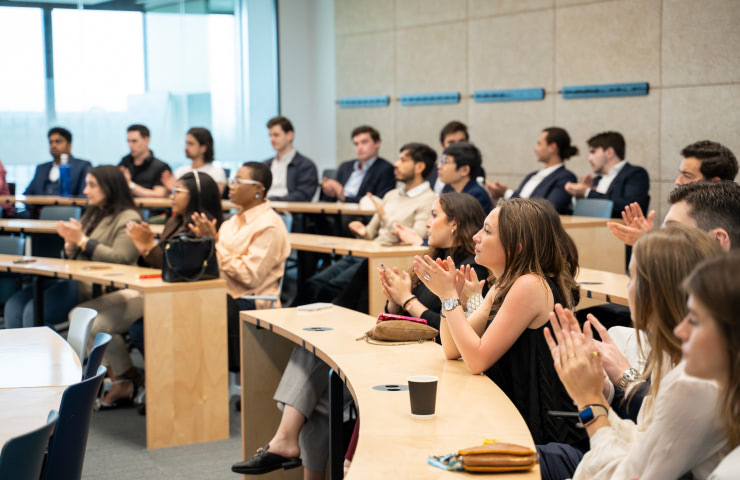04/10/2023
Our new Master in Software Engineering comes at a time when industry trends show the growing need for skilled professionals with plenty of hands-on experience.
The world of computer systems and software applications is a dynamic one, defined by rapid innovation and fast-paced change. And it only promises to get more exciting as digital technologies continue to advance at a remarkable rate.
Consequently, software engineering is quickly becoming one of the fields where expertise is in highest demand, and the sector is full of outstanding opportunities. Since 2020, for example, the latest data shows that demand for skilled software engineers has more than doubled—a growth trajectory that doesn’t seem likely to stop any time soon.
Understanding the times
IE University’s career focus means we always stay ahead of emerging trends in the business world, able to anticipate shifts in the job market and adjust our programs accordingly. One thing that has become clear is the growing need for highly qualified tech leaders with humanistic qualities; those capable of using their skill set not just to address vital business imperatives, but to overcome societal challenges too.
Our recently launched Master in Software Engineering is a response to this call. It’s a comprehensive, innovative program that equips you on two fronts: by helping you build advanced technical skills in today’s latest tech and tools; and by providing an in-depth understanding of the social and ethical considerations that must inform the application of tech in the real world.
Top trends to watch
In the last few years alone, software engineers and developers have essentially transformed the way we live. They’ve created apps that help us do everything from ordering food to securing homes, boosting workplace efficiency and so much more.
In a complex, fast-moving and occasionally volatile digital landscape, the question remains: where will software take us in the years to come? Here are the top five trends shaping software engineering that you should keep an eye on in 2023 and beyond:
- The rise of design thinking
Innovation is essential, but software engineers must align innovative products and services with good customer experience. Whether you’re building mobile apps, web interfaces or automated software, knowing how to provide a seamless customer journey and foster long-term relationships is a key consideration in successful software development today.
This explains the growing popularity of design thinking—a concept that places users’ needs at the heart of the development process.

Its innate capacity to align business goals with user needs makes this an essential skill for any ambitious software engineer. The Master in Software Engineering takes this user-centric approach, offering practical projects that let you practice your growing skills in solving problems for real people in real-life settings.
- Artificial intelligence
In the age of automation, artificial intelligence is a game-changer. The potential to streamline organizational processes and improve cyber defenses makes AI an invaluable asset to the business world.
With the rapid development of AI and related technologies like augmented reality (AR), virtual reality (VR) and machine learning (ML), these innovations are becoming essential, everyday tools in the business world. In fact, AI’s global market size is predicted to expand at a rate of 37% per year to 2030, reaching $1,811.8 billion by then. This accelerated growth will be driven by increased adoption of AI by the public and across different industries—AI is already transforming banking, retail, healthcare, education and more.
The next few years will add a new element to this emerging frontier. Malware capable of pattern recognition and machine learning already exists, and AI will play a pivotal role in tackling the problem. In the Master in Software Engineering, you’ll explore the full range of capabilities that AI and AI-powered technologies make possible, gaining skills and confidence in cutting-edge tech that stand out in the job market.
- A focus on cybersecurity
The digital world may not be the “Wild West” it was in its infancy, but cybercrime is a real threat that organizations have to take seriously. Cybercrime not only puts sensitive user data at risk, it can also damage a company’s operations and do long-term harm to their reputation in a few minutes. Cybersecurity is an arms race; it’s becoming more and more important to find new ways to stay safe.

Continuously developing new cybersecurity methods that protect both systems and their users alike from emerging threats.
For businesses, it’s even more crucial to improve their digital resilience. Labor data shows that the demand for cybersecurity professionals will rise by 35% before 2031. The Master in Software Engineering positions you perfectly for the new opportunities opening in this field. You’ll develop a more holistic approach to cybersecurity, integrating various proven techniques into your comprehensive DevSecOps toolkit.
- Green software engineering
The sustainable—or green—software movement has emerged as a result of the very tangible effects that digitalization and the transition to cloud computing are having on the real world.
Green software engineering is multidisciplinary by nature and draws on knowledge from various fields to foster sustainability. It identifies six core principles to follow when designing green software, with the overall goal of making code and architectural changes that reduce the energy consumed and carbon emitted by the application. The Master in Software Engineering offers you the chance to earn an additional Sustainability certification to bring you up to speed with the movement toward greener solutions in this sector.
- Low-code/No-code development
While software development can be challenging and complex even for seasoned professionals, the emergence of low-code and no-code tools and platforms provides a viable alternative that allows you to build applications with minimal or even no coding required.
According to Gartner, the low-code technologies market will expand by 20% during 2023 to reach an estimated value of $26.9 billion. Fast, efficient and scalable, low-code and no-code tools have the potential to alter the traditional software engineering workflow.
The future is already here
The Master in Software Engineering is an opportunity to step into the future of the industry.

Broad yet intensive, it offers a holistic, deep dive into a wide range of relevant topics, including cloud computing, DevOps, software architecture, programming and artificial intelligence. The program also gives you a chance to beef up your resume with accreditations from big-name industry players such as GitLab, Google Cloud and AWS Cloud.
Joining this program is an investment in your future within a fast-paced industry. You’ll gain the skills not only to become more competitive for your ideal role, but to shape the future of human activity and interaction, one app at a time.








